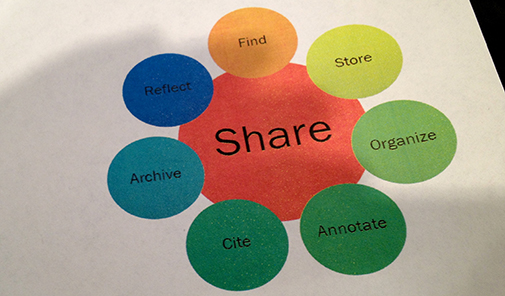A Call for Changing Academic Policy Language
The manner in which scholarship today is analyzed, shared and built upon has undergone rapid transformation from past generations, with all indications that this expansive growth will continue. This awakening is congruent to the conceptualization and production of emergent scholarship as first defined by Ernest Boyer in his 1989 Carnegie report Scholarship Reconsidered, identifying unique domains in which scholarship was prevalent and paramount. As a field founded on forward-thinking and innovation for the greater good, our commitment to innovative formats, subjects and integrations of knowledge construction must be as forthright as our commitment to academic rigor and intellectual integrity, meeting growth in the production and diffusion of knowledge. Below is one example of boilerplate language for academic institutions to employ in an effort to provide protection, amplification and opportunity for faculty to freely engage emergent scholarship.
We encourage faculty to explore emergent scholarship, which means the procedures and histories for assessing scholarship may be ill-equipped to properly service their unique contours. Our existing measurements and hierarchies therefore must be nimble but stay rigorous in order to properly validate and promulgate this work.
General Policy Boilerplate Language Example
Based on Glasick et al in Scholarship Assessed (1996), we promote the following strategy for assessing emergent scholarship.
In the event that a faculty member develops and produces a work of scholarship that is not directly indicative of scholarship examples listed previously or traditionally recognized, the faculty member will work with academic leadership to create a comparable equation to an existing acceptable work of scholarship (i.e., a series of video learning resources would be seen as comparable to the publication of a first edition textbook). If there is not a clearly comparable work of existing scholarship, the faculty member will work with leadership to create an argument for acceptance of this work as scholarship based on its format, impact and rigor.
FORMAT - The need to publish this work in its specific format, whatever form or fashion that may be, needs to be addressed by the faculty member; why does this scholarship require publication in this particular mode?
IMPACT - The faculty member needs to provide evidence of the significance and inherency of this work on its audiences and communities (the academic field, the local community, the educational community, other pertinent communities).
RIGOR -It is the responsibility of the faculty member to provide the instrumentation in which quality can be measured as well as the methodology for soliciting and iterating based on peer review.

Educause Report on UBC Policy Changes
In July of 2018, Educause reported on a change at the University of British Columbia in their promotion, tenure and review policies, adding the creation/adoption/editing of Open Education Resources to accepted scholastic output.
Learn more

A multi-criteria framework for assessing scholarship based on Boyer's scholarship model
From 2013, a research study engaged the Analytic Hierarchy Process to address questions of effective, fair and consistent methods for evaluating faculty scholarship. Utilizing a Boyer framework, the findings both encourage further engagement of emergent scholarship but identify obstacles to adoption, specifically historical lack of consideration for teaching and learning as a form of scholarship.
Learn more

